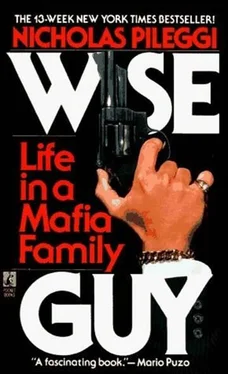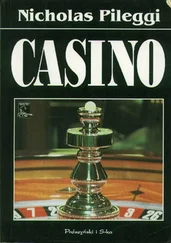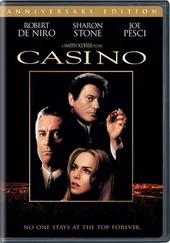"It was like an open market. There was a long list of items in demand, and you could get premiums if you grabbed the right cargo. That was another reason forgoing out and snatching a truck instead of waiting for some cargo guy to steal it for you. Clothing, seafood, fabrics, and cigarettes topped the list. Then came coffee, records and tapes, liquor, televisions and radios, kitchen appliances, meat, shoes, toys, jewelry and watches, on and on, all the way down to empty trucks. When stolen securities got big, we used to have Wall Street types all over the place buying up bearer bonds. They would send them overseas, where the banks didn't know they were stolen, and then they'd use the hot bonds as collateral on loans in this country. Once the stolen bonds were accepted as collateral, nobody ever checked their serial numbers again. We're talking about millions of dollars in collateral forever. We got robbed on those jobs. At that time we didn't have any idea about collateralizing foreign loans. The bankers took us to the cleaners. We got pennies for the dollar."
During the 1960s and early 1970s hijacking was big business. Almost no one went to jail. The airlines were happy to underestimate their losses and pick up the insurance money rather than assume the cost, delays, and inconvenience of additional security. The trackers said they were powerless to fight the union, and the union insisted that the airlines were responsible because they refused to spend enough money to safeguard the drivers. To make matters more complicated, the legislators of the state of New York had never gotten around to codifying the crime of hijacking. When caught, hijackers had to be charged with other crimes, such as kidnapping, robbery, the possession of a gun, or possession of stolen property. And few of these charges ever seemed to stick.
According to a 1960s Joint New York State Legislative Committee on Crime study, at least 99.5 percent of hijacking arrests resulted either in the charges being dismissed or in the defendants receiving small fines or probation. During one year covered by the report the committee traced 6,400 arrests for criminal possession of stolen property and found there were only 904 indictments, 225 convictions, and as few as 30 state prison commitments. A committee case study of eight defendants arrested at the tune for the possession of more than $100,000 worth of stolen women's clothing noted that each defendant was fined $2,500 and placed on probation by New York Supreme Court Judge Albert H. Bosch. The men were all part of the Robert's Lounge crew working for Jimmy Burke and Paul Vario. During the next five years, while the eight men were still on probation, they were arrested an additional seventeen times on a variety of charges, including robbery, possession of stolen property, and burglary. But even then, and despite the fact that probation officers recommended that hearings for violation of probation be initiated, Judge Bosch continued the men on probation. He later said that he could not make a final decision concerning the violation of probation until the guilt or innocence of the defendants had been determined.
Eventually Henry was questioned by police so many times and became so familiar with the process and its loopholes that he no longer worried about getting caught. Of course he tried not to get caught. It was not profitable to get caught. You had to pay the lawyers and the bondsmen, and you had to pay off cops and witnesses and sometimes even the prosecutors and judges. But when he was caught, Henry was not particularly concerned about the addition of yet another charge to those already pending against him. What really worried him was whether his lawyer was adept enough to cluster the court appearances in such a way as to minimize the number of days Henry had to take time away from business and appear in court. Going to court and facing accusers and cops was not the harrowing experience it might be for others; for Henry and for most of his friends it was rather like going to school as kids. Occasionally they were forced to attend, but the experience left little or no impression. More time would be spent figuring out where to eat lunch than was spent on the issues before the court.
"There was no reason to worry. During the pre-trial months and years you just kept throwing money at your lawyer to keep you outside long enough for you or him or one of his friends to fix the case. That's all there was to it. You stayed outside and made as much money as you could so that you had the green to pay your way out. I've never been on a case where somebody wasn't fixed. It's just business. Usually the lawyer has the kinds of contacts that can keep you free on bail as long as you want. They can keep you from running across some hard-nosed judge who sends you inside or rushes the case along. Then you've got the private detectives who work for the lawyers. They are usually ex-cops, and lots of times you know them from the days when you paid them off on the streets. They have good contacts with cops, and arrangements can be worked out so that testimony or evidence is changed just a little bit, only enough to make a tiny hole through which your lawyer can help you escape. Then even if none of this works and you've got to go to trial, you always try to reach the jury.
"Everybody reaches the jury. It's business and it's easy. During the jury selection, for instance, your lawyer can find out anything he wants to know about a juror-where he works, lives, family status. That sort of personal stuff. The 'where he works' is what interested me mostly. Where a guy works means his job, and that always means the unions, and that's the easiest place to make the reach. The whole crew and the lawyers and the private detectives and everyone you know are all going through the list. I know this guy. I know that guy. I know the union boss here. I know the shop steward. I know the delegate. I know a guy who works with this guy's brother over there. Little by little you get closer and closer to the guy, until you go to someone you can trust who can go to someone he can trust, and you make the deal. No big deal. It was business. All you really wanted was to hurry it up so you could get back to the airport and steal some more."
The first accounting of cargo thefts at Kennedy Airport was released in October of 1967; it revealed that $2.2 million in cargo had been stolen during the preceding ten months. The amount did not include the hundreds of hijackings of airport cargo stolen outside the airport, nor did it include thefts valued at less than one thousand dollars. The total also did not include $2.5 million in nonnegotiable stock taken from Trans World Airlines. The $2,245,868 worth of cargo stolen during the ten-month period had been grabbed right out of the storage bins and security rooms of the Air Cargo Center. At the time, the Air Cargo Center was the largest such facility in the world. It was a thirteen-building complex of warehouses and truck-loading ramps spread over 159 acres. Space in the buildings was leased to twenty-eight airlines, air express agencies, customhouse brokers, federal inspection services, and carting companies. Each of the airlines kept its own valuables in specially guarded security rooms, some of them enclosed by steel or cinder blocks, others by wire cages. In addition, the airlines all had their own guards or hired private detective agencies to protect valuables at the twenty-four-hour-a-day facility.
Besides the airline security personnel, the Port Authority had 113 policemen on duty during the average day. There were also customs inspectors, FBI men, and police from the 103rd Precinct roaming through the facility on a fairly regular basis. But during the ten-month period pinpointed by the survey forty-five major robberies were committed there, including thefts of clothing, palladium ingots, pearls, watches, musical instruments, hydraulic pumps, cigarettes, phonograph records, drugs, wigs, and diamonds-and $480,000 in cash, which was stolen shortly before midnight on Saturday, April 8, from the locked and guarded security room at the Air France cargo building.
Читать дальше












